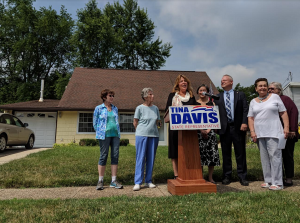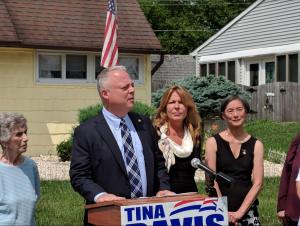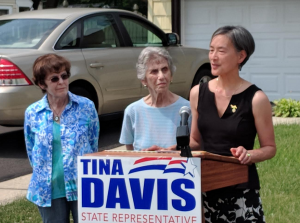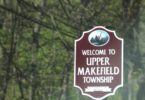The legalization of sports betting is expected to be a cash cow for Pennsylvania’s coffers.
A group of three Bucks County Democratic state lawmakers have a plan to use the tax proceeds from sporting betting to help qualified homeowners pay property taxes.
Standing outside senior citizen Gemma Livolsi’s home of 25 years on Cotton Road in Middletown’s Levittown section Tuesday, State Rep. Tina Davis of Bristol Township, State Rep. Perry Warren of Newtown, and State Rep. Helen Tai of Solebury, announced legislation that proposes taking the 34 percent tax on gross sports betting revenue collected through approved casinos and mini-casinos and putting it toward the state’s property tax relief fund.
The property tax relief fund that Davis is proposing sending sports betting tax revenues to currently is used to distribute funds to school districts to help offset property taxes. Residents have to meet criteria to be eligible to receive the homestead exclusion.
This fiscal year, Pennsylvania will dole out $33.8 million to Bucks County school districts to help reduce property taxes for 152,400 residents, according to Pennsylvania Department of Revenue data.
Davis said that she has heard of hardships from seniors and those down on their luck who fear losing their homes due to the burden of rising property taxes.
“Senior citizens on fixed incomes are often faced with struggling to pay for their food and medication without losing their homes,” Davis said.
Tai and Warren said they have also heard the worry from constituents about rising property taxes and how it can especially impact seniors who live on fixed incomes.
The Pennsylvania Department of Revenue has estimated that legalized sports gambling could bring as much as $11.2 million in fiscal year 2018-2019. In future fiscal years, the program could bring in as much as $50 million in tax revenue.
Davis said that as of now, the tax revenue would go into the state’s general fund and is not assigned to any programs.
Assigning the revenue, according to Davis, to property tax relief in the form of the homestead exclusion fund could help overburdened taxpayers.
The rollout of legal sporting betting in the state is in the works in Harrisburg following a groundbreaking U.S. Supreme Court decision earlier this year and expected to be up and running within months.

State Rep. Tina Davis announcing the proposed legislation in Levittown Tuesday.
Credit: Tom Sofield/NewtownPANow.com
Warren said Davis’ proposal would balance Pennsylvanians’ love of sports and desire to reduce property taxes.
“When gambling was introduced in Pennsylvania, we were assured property tax relief. Unfortunately, we haven’t seen as much relief as we were promised,” Davis said. “I am committed to making sure that the proceeds from any further expansion of gambling will go toward property tax relief. This is not a silver bullet, but it is one way we can help make sure seniors like Mrs. Livolsi can live without fear of losing their homes because of their property tax bills.”
Tai said the proposal would help everyday residents across the state.











